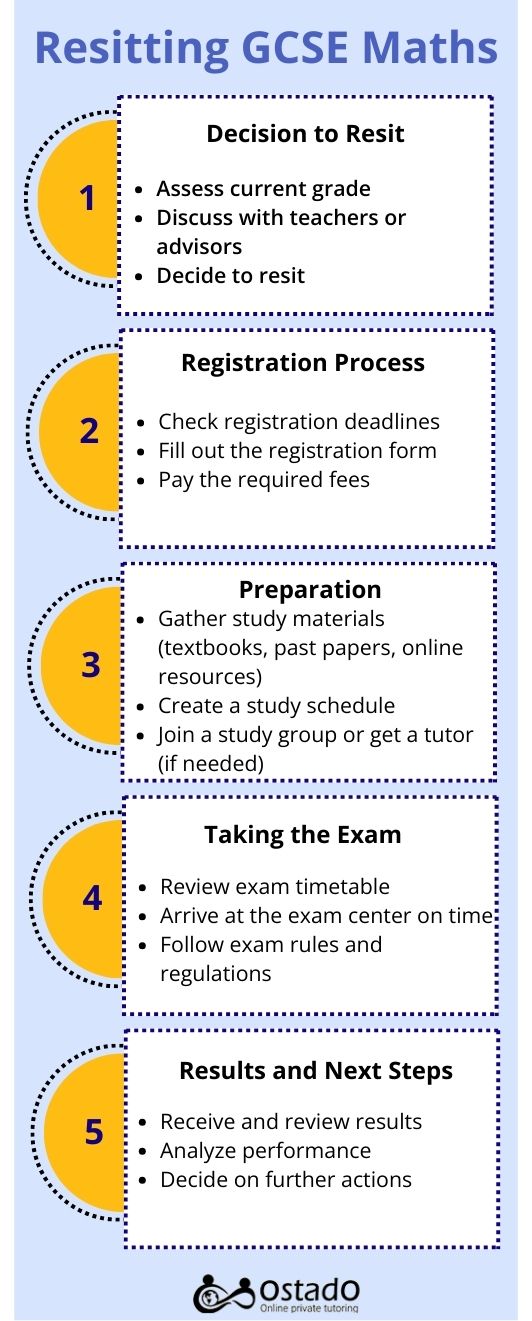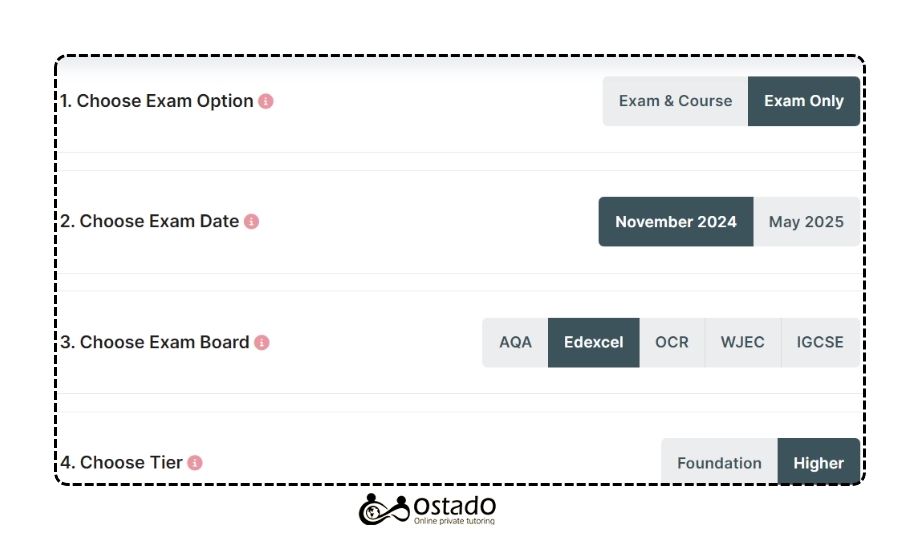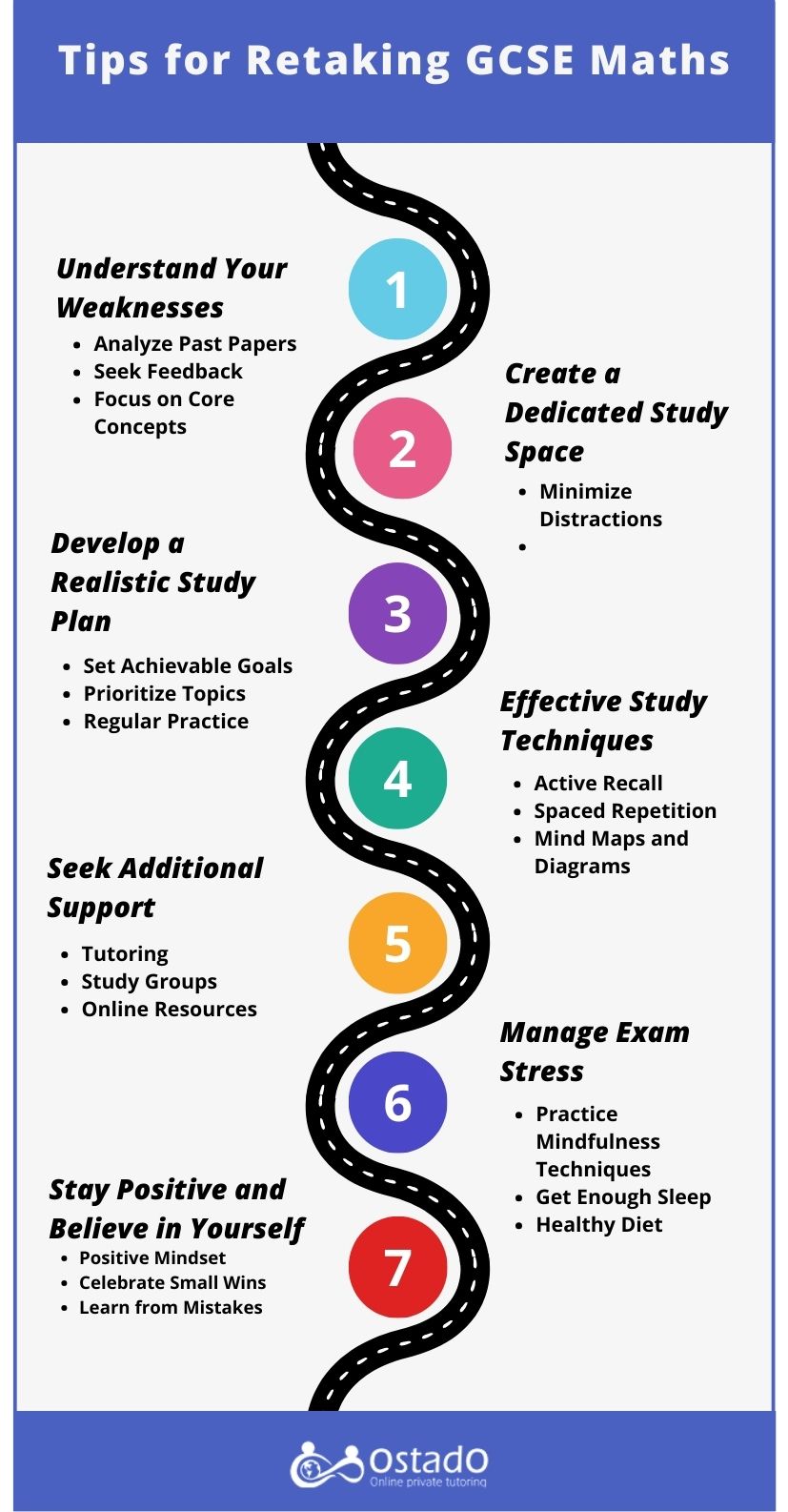The GCSE Maths exam can be a significant hurdle for many students. A less-than-ideal result can be disappointing, but it’s important to remember that it’s not the end of the road. Resitting GCSE Maths offers a valuable opportunity to improve your performance and open up new pathways. With the right strategy and dedication, you can overcome challenges and achieve your academic goals
How to Retake Maths GCSE
First, you should discuss the situation with your teachers at school. They can provide you with valuable guidelines about the process, deadlines and the available support programs. Remember, there is only shame in giving up, and the fact that you are enquiring about how to resit GCSE maths is very endeavouring and praiseworthy.
Then, you must register for the resit exam. Normally, your school arranges the resit, but if you are no longer enrolled, you must register as a private candidate. You can book the resit with the original exam board to familiarise yourself with the exam format and style. Or you can register for a resit with a different exam board.
I have elaborated on GCSE retakes in a separate article. Click on retaking GCSEs to learn everything you need to know about this topic.
Get Help From a Tutor
According to the statistics, only 3.5% of the students managed to get 9 in GCSE maths, which makes it one of the hardest GCSE subjects. The problem with maths is that it’s sometimes very abstract and intangible.
You can find a GCSE maths tutor on Ostado to receive personalised lessons on the topics that perplex you. Book the first session for free now.

Terms and Conditions for Maths GCSE Resit
- You can resit GCSE maths and English in November, but other subjects can only be resit in May/June.
- Anyone can resit GCSE maths for as many times as they want.
- There is no age restriction for the examinees.
- Resitting maths GCSE is free for you if you are under 18 and enrolled in a school. Otherwise, you should enquire about the fees from the exam board and the exam centre.
- If you get a lower grade in the GCSE maths resit (than the original), the higher grade will be considered as your GCSE grade.
- The GCSE maths resit is the same qualification as the original exam.
- You can choose to resit the GCSE maths exam in a different exam centre or a different exam board.
- The participants can choose between the two GCSE maths tiers based on their goals. The Foundation tier is suitable for students looking for a more accessible difficulty level. The Foundation tier is targeted at grades 1 to 5 and it covers only the essential mathematical concepts. The Higher Tier targets grades 4 to 9 and it covers advanced concepts as well as the essential concepts. Aim at least for grade 4 in either tier.
- The grade boundaries for both tiers are equivalent.
Where To Retake Maths GCSE Exams
If you are still enrolled in school, it will arrange the exam. If not, you must contact an exam centre and register to resit privately. The good news is that if you’re not enrolled in school or you think GCSEs are not the right option for you, you can pursue further education through other alternatives to GCSEs.
GCSE Maths Private Exam
As a maths GCSE private candidate, you should check the exam board websites for approved exam centres that accept private candidates. You can use the search tool for exam centre to find the nearest exam centre.
When to Resit Maths GCSE Exams
You can resit GCSE English and maths exams in October/November. You can also take the exams next year in May/June. But you must book the GCSE maths exam in advance. The registration deadline for the October/November 2024 resit is mid-September, and for May/June resit is mid-February. You should check major exam boards (AQA, Edexcel, OCR) announcements for the exact registration deadlines and GCSE maths exam dates.

How To Prepare for GCSE Resits
I’d start by looking back and finding the reason I couldn’t achieve the desired GCSE grade in the first attempt. Did you have a practical revision plan? Did you spend more time on the challenging topics? Did you practise exam questions before the exam?
If you want to resit the GCSE maths in November, you should plan an intensive schedule to prepare for the exam. But if you want to take the exam next year, you can have a more comprehensive plan.
A comprehensive revision plan is very inclusive, so you should try to incorporate various resources into the plan and assess yourself regularly to see if you are on the right track. You can find more brief tips on the best way to revise for GCSE maths here.
Additionally, an early start in revising for maths resit allows you to go over different resources to gain a deep knowledge of GCSE maths concepts. Diversifying your makes you more prepared for the exam and boosts your confidence, which will eventually get your grades up.
You can also download these free GCSE revision timetable templates to write your revision schedule.
Make Your Second Attempt Count
If you want to get better results, you should change some of your ways. These guidelines can get you closer to better grades.
- Learn from mistakes: Practising past papers and seeking feedback from your teachers can help you identify your weaknesses. You should make a revision plan focusing particularly on these weaknesses.
- Study smart: You can maximise the productivity of your revision plan by employing study methods that match your learning style.
- Get support: If you feel you’re stuck with a certain concept or need a push to keep on studying, don’t hesitate to ask for professional help from educational counsellors or private GCSE maths tutors. They know what’s blocking your way, and they have the key, so they can save you a great deal of time and lead you to your desired results.
- Stay positive: You should stay positive and believe in yourself. You’re doing an honourable job by not giving up.

Significance of English and Maths
English and maths are the most important GCSE subjects. A good grade in maths means you are equipped with critical thinking and problem-solving skills. On the other hand, a high grade in GCSE English indicates your communication skills in written and spoken language.
Thanks to the importance of these subjects, they are prerequisites for further academic study, and many post-secondary education courses require a pass in these GCSE subjects. Also, a pass in maths and English is one of the main requirements for finding a job as a young adult. Employers consider your maths and English GCSE grades to understand how well you can deal with numeracy and literacy tasks.
FAQs - Retaking GCSE Maths

